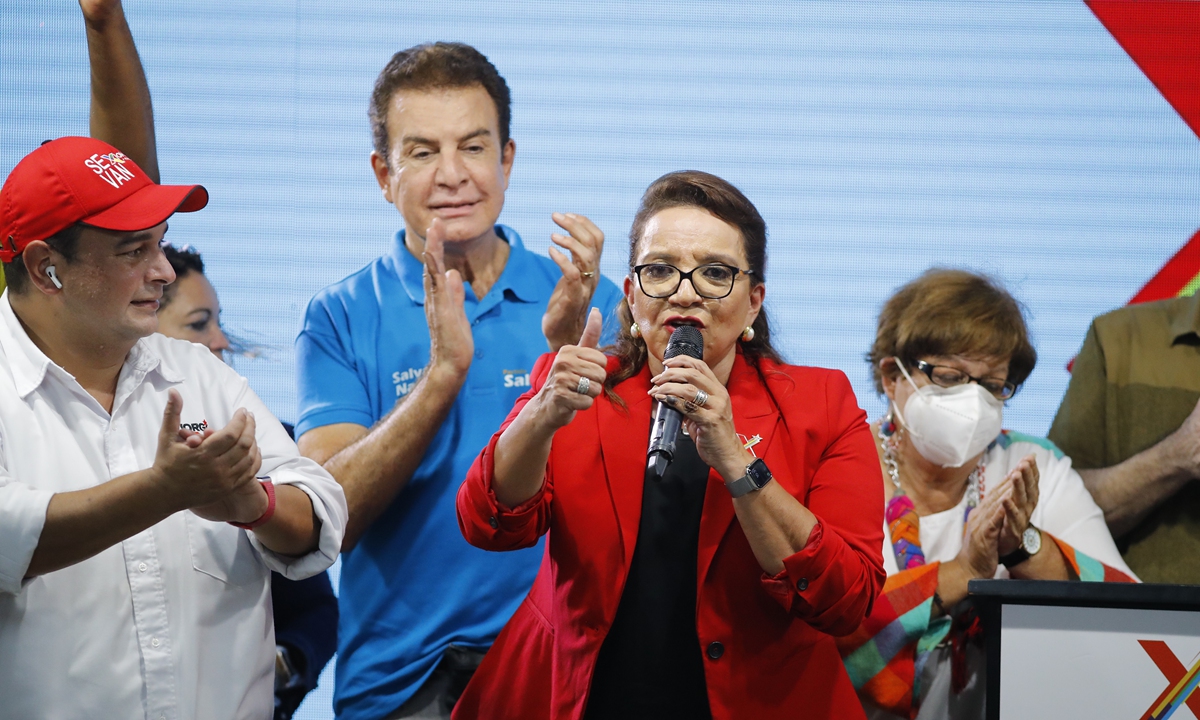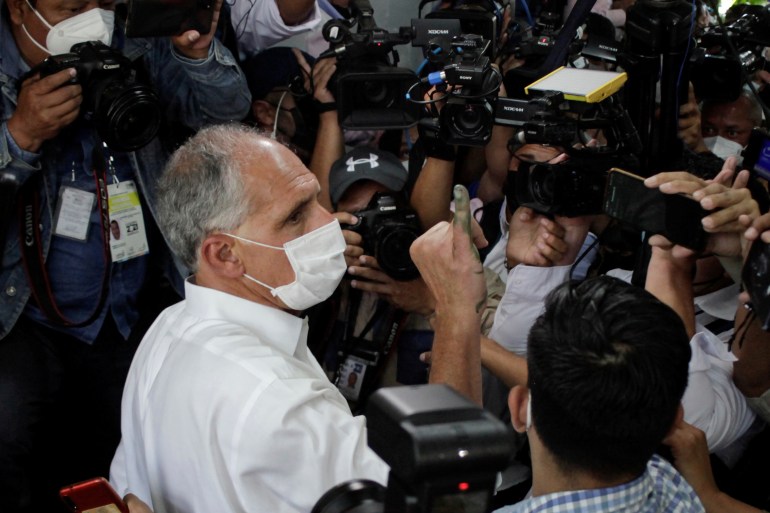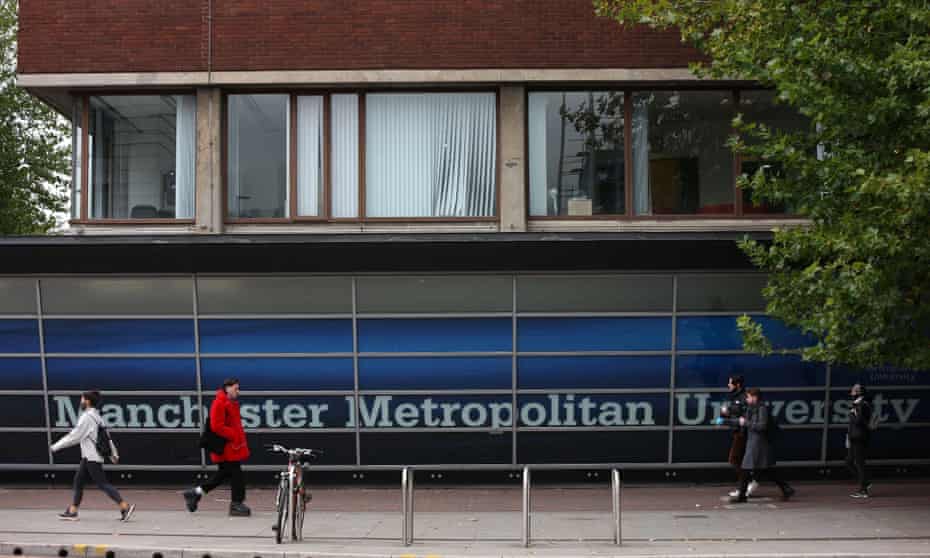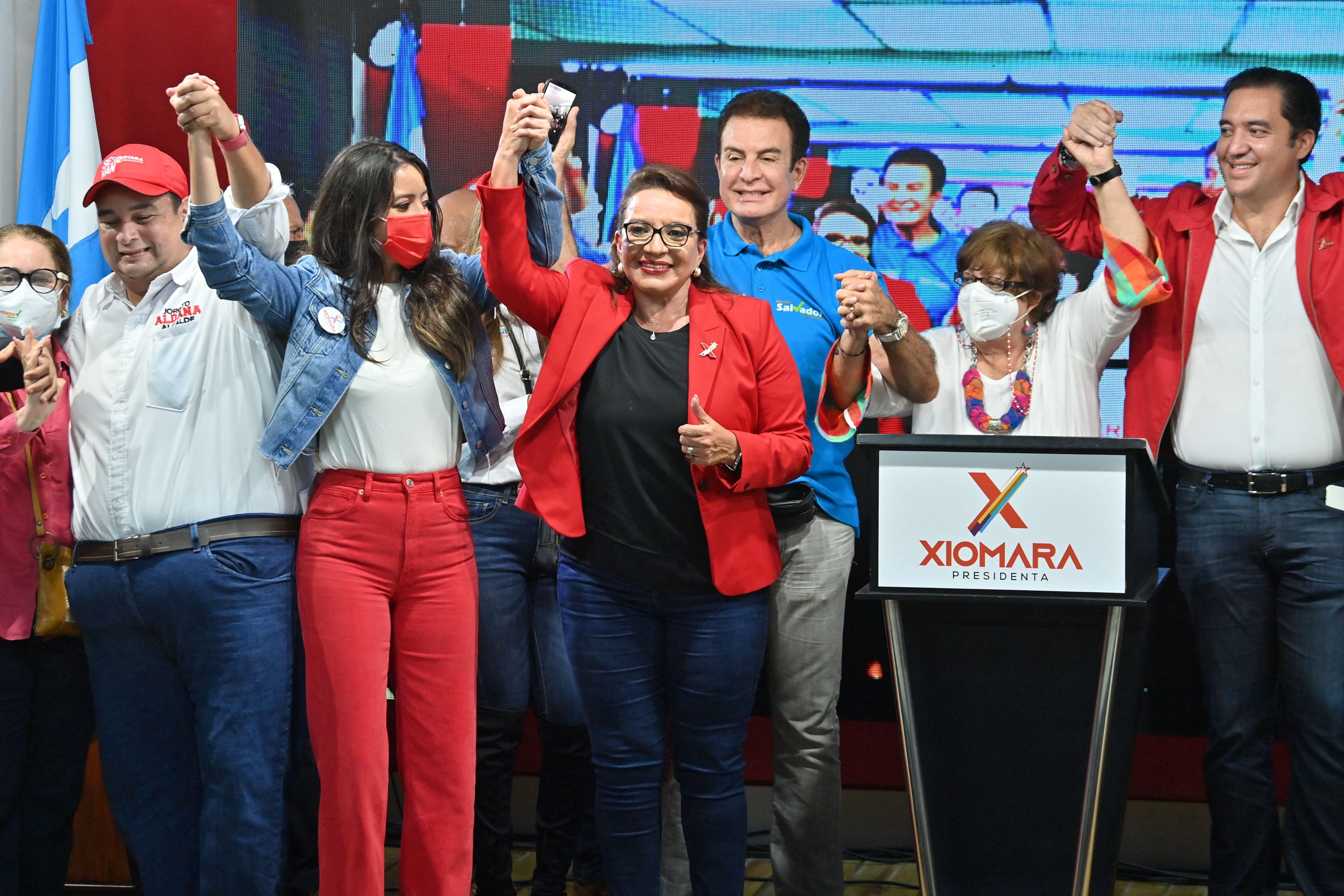Taiwan secessionists, US meddlers to suffer ‘heavy blow’ amid ‘massive’ turnout in Honduras election
By Deng Xiaoci and Wan HengyiPublished: Nov 29, 2021

Presidential candidate Xiomara Castro (Red) speaks after hearing the partial results of the elections, in Tegucigaloa, Honduras, 28 November 2021. Photo: thepaper.cn
Initial results from the Honduras presidential election showed that Xiomara Castro, the presidential candidate of the opposition is leading by 20 percentage points over the conservative ruling party contender Nasry Asfura.
Chinese observers said that they welcome the approaching victory of Castro, who is on track to becoming the first female president of the Central American country, as she once promised that if she wins, she would immediately open diplomatic and commercial relations with China and de-emphasize "ties" with the Taiwan authorities.
They said that such a result with a "massive turnout" showed that Hondurans are growing sick of the US-backed administration and Hondurans have realized that compared to the "dollar diplomacy" of the island of Taiwan, upholding the overriding global trend of the one-China principle could bring them more tangible benefits, even though its diplomatic policy may not be the deciding factor in the Latin American country's election.
Commenting on the lead of Castro, Wang Wenbin, Chinese Foreign Ministry spokesperson, said on Monday that China is willing to develop friendly and cooperative ties with any country on the premise of upholding the one-China principle.
Honduras is one of the remaining 15 countries in the world that still have so-called "diplomatic ties" with Taiwan island, and if Castro's victory is officially confirmed and she keeps her promise, Honduras' new administration's change in attitude over the matter could bring an exemplary effect to the 14 other countries, Jiang Shixue, a professor and Director of Center for Latin American Studies at Shanghai University, told the Global Times on Monday.
If Honduras severs "ties with Taiwan," it will deal a heavy blow to the secessionists as well as sound the alarm for countries like Lithuania, which recently took on a wrong path over the Taiwan question by supporting Taiwan secessionists, he noted.
Hondurans and politicians could not overlook how its neighboring country El Salvador, which cut "diplomatic ties" with Taiwan island in 2018 and established formal ties with China, has prospered ever since, observers said. It is clear that many countries in this region have chosen to establish diplomatic relations with China for the development of their own societies. In contrast to the shady political donations provided to these countries by the island of Taiwan, as the island's netizens cynically pointed out, the mainland's aid and investment bring tangible benefits to the society.
Official data showed that in 2020, trade between China and El Salvador reached $1.11 billion, and exports from El Salvador to China were worth $172 million, a 51.6 percent year-on-year increase. China has also offered to help build several major infrastructure projects in El Salvador, including a stadium and water treatment plant, inviting the country to join the Belt and Road Initiative.
Since March, China has also provided COVID-19 vaccines to aid El Salvador's battle against the pandemic. Thanks to China's timely aid, more than 55.6 percent of El Salvador's population has been inoculated, leading the Latin American region, the Xinhua News Agency reported on October 27.
In contrast, Honduras had attempted to get access to China-made coronavirus vaccines, when the Central American nation was experiencing a shortage several months ago. However, the nation's chief cabinet coordinator, Carlos Alberto Madero, told the Financial Times that being Taiwan's "ally" had prevented it from acquiring vaccines from China. He warned that Tegucigalpa may switch diplomatic recognition to Beijing, as access to vaccines was "much more urgent than anything else."
As of press time, the vaccinated rate in El Salvador was 62.3 percent and that for Honduras was less than 40 percent.
However despite the prospect of fostering formal ties with China if Castro is elected, the US will not give up interfering in the process, analysts said.
A visiting US delegation led by Brian Nichols, the US Assistant Secretary of State for Western Hemisphere Affairs to Honduras made clear to Honduran presidential candidates last week that the US wants Honduras to maintain its long-standing "diplomatic" relations with the island of Taiwan.
The US also warned Central American nations of "the risks associated with China's approach to the region," Reuters reported.
Slamming such apparent US coercion, Chinese Foreign Ministry spokesperson Zhao Lijian said on November 25 that it is not China's approach that the Latin American people should be wary of, but the US' long-standing hegemonic approach of regarding Central American countries as the US "backyard."
The US has felt a sense of losing control in its "backyard" as it fears that Honduras would follow El Salvador, Panama and the Dominican Republic and establish ties with China. It will exert pressure from all dimensions to hinder the process, which might include sanctions or a threat to pause aid, observers noted.
Opposition leads after ‘massive’ turnout in Honduras election
Victory for Xiomara Castro would make her Honduras’s first female president and first from the left since 2009.

Castro, LIBRE's presidential candidate, and vice-presidential candidate Nasrala in upbeat mood after the closing of the general election [Jose Cabezas/Reuters]
Published On 29 Nov 2021
Initial results from the presidential election in Honduras show opposition candidate Xiomara Castro with a clear lead over conservative ruling party contender Nasry Asfura after both sides claimed victory after polls closed on Sunday.
Castro, whose running mate is Salvador Nasrala, declared herself the winner despite orders from the National Electoral Council to political parties to await official results.
“We win! We win!” Castro, Honduras’ former first lady who is making her third presidential run, told cheering Liberty and Refoundation Party (LIBRE) supporters when only a fraction of the ballots had been tallied.
The National Party also quickly declared victory for its candidate, Tegucigalpa Mayor Nasry Asfura, but the early returns were not promising.
With 45 percent of the polling station tallies in, Castro had 53 percent of the votes and Asfura 33 percent, according to the National Electoral Council preliminary count. The council said turnout was more than 68 percent.
If the opposition standard-bearer wins, she would become the first female president in Honduras and return the left to power for the first time since her husband, former President Manuel Zelaya, was overthrown in a 2009 coup.
The electoral council earlier said more than 2.7 million voters had already cast ballots, a figure described in a statement as a “massive turnout” with more votes yet to be counted.
The initial turnout is already higher than the 2017 total, said council president Kelvin Aguirre. But nearly 8 percent of 5,755 polling places were having transmission problems filing vote tallies with electoral authorities, which was expected to delay results.
A strong turnout has raised expectations of change after a dozen years of National Party rule.

Long queues at many polling stations raised expectations of a change in government [Orlando Sierra/AFP]
Left-wing Castro has sought to unify opposition to outgoing President Juan Orlando Hernandez, who has denied accusations of having ties to powerful gangs, despite an open investigation in the United States linking him to alleged drug trafficking.
After allying with the 2017 runner-up, a popular TV host, most polls have reinforced her frontrunner status.
“We can’t stay home. This is our moment. This is the moment to kick out the dictatorship,” said Castro, mobbed by reporters just after voting in the town of Catacamas
Long queues could be seen at many polling places across the country, where some 5.2 million Hondurans are eligible to vote.
The election is the latest political flashpoint in Central America, a leading source of US-bound refugees and migrants fleeing chronic unemployment and gang violence. Honduras is among the world’s most violent countries, although homicide rates have dipped recently.
Central America is also a key transit point for drug trafficking, and an area where concerns have grown over increasingly authoritarian governments.
The vote also has prompted diplomatic jostling between Beijing and Washington after Castro said she would open diplomatic relations with China, de-emphasising ties with Taiwan, the self-ruled island that China claims as its own.
‘This is Honduras’
Asfura, a wealthy businessman and two-term mayor of the capital, is Castro’s main rival among 13 presidential hopefuls. He has sought to portray his rival as a radical while trying to distance himself from the unpopular incumbent.
After casting his ballot, a measured Asfura said he would respect voters’ verdict.
“Whatever the Honduran people want in the end, I will respect that,” he said.
Some voters consulted by the Reuters news agency expressed dissatisfaction with their choices, but many others had clear favourites.
“I’m against all the corruption, poverty and drug trafficking,” said Jose Gonzalez, 27, a mechanic who said he would vote for Castro.
Hernandez’s disputed 2017 re-election, and its ugly aftermath, looms large. Widespread reports of irregularities provoked protests that killed more than two dozen people, but he rode out the fraud claims and calls for a re-vote.
Alexa Sanchez, a 22-year-old medical student, lounged on a bench just after voting while listening to music on her headphones and said she reluctantly voted for Castro.
“Honestly, it’s not like there were such good options,” she said, adding she was highly sceptical that the vote would be clean.
“I don’t think so,” she said. “This is Honduras.”

If Castro wins, she will become Honduras’s first female president and return the left to power [Jose Cabezas/Reuters
]
Asfura has tried to distance himself from the unpopular incumbent [Fredy Rodriguez/Reuters]
Numerous national and international election observers monitored Sunday’s voting, including the European Union’s 68-member mission.
Zeljana Zovko, the chief EU observer, told reporters around midday that her team mostly saw calm voting with high turnout, although most polling stations they visited opened late.
“The campaign has been very hard,” said Julieta Castellanos, a sociologist and former dean of Honduras’s National Autonomous University, noting that Castro has “generated big expectations”.
Castellanos said post-election violence was possible if the race proved especially close, if a large number of complaints were lodged, or if candidates declared themselves victorious prematurely.
Alongside the presidency, voters are also deciding the composition of the country’s 128-member Congress, plus officials for some 300 local governments.
In Tegucigalpa’s working-class Kennedy neighbourhood, 56-year-old accountant Jose, who declined to give his surname, said he would stick with the ruling party.
“I have hope Tito Asfura can change everything,” he said, using the mayor’s nickname.
“Look, here the corruption is in all the governments.”
SOURCE: REUTERS




















